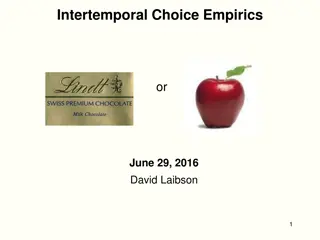
Different Types of Income in Personal Finance
Explore the various types of income in personal finance, including full-time vs. part-time work, paid vs. unpaid compensation, and different forms of payment such as salary, wage, stipend, and commission. Learn about the benefits and differences between full-time and part-time employment, as well as mandatory and voluntary benefits associated with each type of work.
Download Presentation

Please find below an Image/Link to download the presentation.
The content on the website is provided AS IS for your information and personal use only. It may not be sold, licensed, or shared on other websites without obtaining consent from the author. If you encounter any issues during the download, it is possible that the publisher has removed the file from their server.
You are allowed to download the files provided on this website for personal or commercial use, subject to the condition that they are used lawfully. All files are the property of their respective owners.
The content on the website is provided AS IS for your information and personal use only. It may not be sold, licensed, or shared on other websites without obtaining consent from the author.
E N D
Presentation Transcript
CAREER CHOICE CHAPTER 1, LESSON-1-1 FIRST ELEMENT OF PERSONAL FINANCE - INCOME
OBJECTIVES Cover the First Element of Finance - Income Types of Work - Full-Time vs Part-Time, Paid vs Unpaid How you are paid your income When you are paid your income
TYPES OF EMPLOYMENT Two Types of work that you may perform: 1. Full-Time 2. Part-Time
FULL-TIME - an employee who works an average of at least 30 40 hours per week (for ND) Employers can define Fulltime between 30 or 40 hours Eligible for Mandatory benefits and Voluntary Benefits Benefits equate to approximately 28% more than salary/wage Mandatory benefits : required to be given to employees different by state but often include disability, FMLA, workman's compensation, Social Security and Medicare, Unemployment insurance, and Workers' compensation insurance Voluntary benefits: employers can choose to offer these benefits and employees can choose to take or not take them. These include -Vacation time, PTO, health insurance, retirement plans, dental etc. Different by employer and use to recruit
FULL-TIME VS PART -TIME Part-Time -An employee who works an average of less than 30 hours per week Benefits such as vacation, and sick leave, dental insurance ARE NOT required Often not offered but reduced benefits can be offered to attract and retain good employees.
COMPENSATION TYPES PaidWork - when an employee is given compensation for employment including cash payment and (possibly) other tangible benefits (health insurance, company stock, etc.) Unpaid Work -When an employee is not given any monetary compensation for their work What they gain is work experience, a sense of accomplishment, etc.
HOW YOU ARE PAID YOUR INCOME 1. Salary 2. Wage 3. Stipend 4. Commission
1. SALARY - offered an annual amount to compensate you for the full value of your work. Set yearly amount Example: $54,000 a year (this is how you are offered employment) Employees will then calculate pay as hourly, weekly, or monthly. Ex = $4000 a month Paycheck is always for the same amount AKA - Exempt Employees - workers who DO NOT qualify for overtime pay (expected to perform their job duties regardless of how many hours they work)
2 WAGE - paid a set amount for every hour worked AKA Hourly wage Size of each paycheck depends directly on how many hours you work. Ex: Paid $20 an hour Non-Exempt - workers entitled to earn the federal minimum wage and qualify for overtime pay when working more than 40 hours per week Overtime Pay: earn one-and-a-half times your hourly rate, for every hour you work above a standard 40-hour workweek
3 - BONUS - additional incentives offered to employees on top of their regular salary, often aimed at increasing productivity and employee retention Common types of bonuses include profit-sharing, spot bonuses, sign-on bonuses, milestone bonuses, annual bonuses, retention bonuses, referral bonuses, holiday bonuses and stock options. Discretionary:These bonuses are awarded at the discretion of the employer, meaning they are not stipulated in your employment contract Nondiscretionary:These incentive based payments are outlined in your employment contract . If you meet the requirements (ex increase sales by 20%) of your contract, the bonus is paid to you
4 COMMISSION - sum of money that is paid to an employee as a percentage of what he/she sold Straight commission you receive no hourly wage, but get paid a percentage of what you sold If sold $1000 in books get 40% = $400 gross wage Base plus commission paid an hourly wage or lump sum plus a percent of your sales. For example, a Scheels employee worked 10 hours this week at $10 plus 5% of sales Wage = 10X $10 sold $1000 for the week at 5% base pay, and = $10 X 10 = $100 base plus $1000 X .05 = $50.00 for a gross wage of $150
JOBS THAT EARN STRAIGHT COMMISSION Talent agent Recruiter Literary agent Promoter Securities, commodities and financial services sales agent Pharmaceutical sales representative Sales Engineers Real estate agent
MINIMUM HOURLY WAGE Can I pay you whatever I want per hour, salary etc.? No there are laws that require a minimum wage Minimum wage: the lowest wage permitted by law
QUESTIONS TO ASK? What is the minimum wage for the US? Does every state have the same minimum wage? Is the minimum wage the same for every single type of Job?
MINIMUMWAGE ASSIGNMENT 1. Go to google classroom and complete the minimum wage assignment 2. After Completing The Assignment, fill in the bottom of page 3 of your activity packet.
WHEN YOU ARE PAID # of Checks for year? How Often Weekly Biweekly (every two weeks) Bimonthly (twice a month) Monthly 52 checks 26 Checks 24 Checks 12 Checks For Salary: divide by number of checks to determine paycheck amount Example: $36,000 salary with 24 paychecks = $1500 per check, or $3000 a month.
YOU TRY: If you are paid a salary of $48,000 being paid bi-monthly what is your gross wage per check? $2,000 If you were paid $48,000 and paid weekly, what is your gross wage for each check? $923.08
.For Wages: multiply the hourly wage by number of hours per check If you work full time at $15 an hour. What is your gross wage for 40 hours $600 a week If you get paid every two weeks and work 40 hours per week at $10 $800 every 2 weeks If you are getting paid bi-weekly working 40 hours per week for $10 per hour, what is your annual wage? $20,800 per year
Calculate You Earn commission at 3% for selling a house for $350,000 $10,500 You Earn a base salary of $15 and hour with 3% commission, you worked 40 hours, sold $6,000 in product for the week. $600 weekly wage + $180 commission Total of $780
IF GROSS PER WEEK IS $400 Is this the amount of money you have to spend? Why or Why not? Because that is gross wage and no taxes have been taken out. Do not plan your finances around your gross!!!
TYPES OF UNPAID WORK There are a few different types of unpaid work to consider: 1. Volunteer - Someone who generally works part-time, in service of a company or organization Being a volunteer generally implies you are not paid A volunteer is generally someone who wants to be helpful, but doesn t necessarily want a career in that field
TYPES OF UNPAID WORK 2. Intern - a student or trainee who works, with or without pay, at a trade or occupation in order to gain work experience in a particular field Can be paid (by wage or stipend) or unpaid While many internships can lead to a job offer, it is not required. Apprentice most often paid but some unpaid
QUICK WRITE ACTIVITY Based on what you ve learned, what type of work do you think you are currently most interested in? Full-Time vs Part-Time? Paid vs Unpaid? If paid, hourly wage or salary? If unpaid, as a volunteer or intern? Both? Why do you feel that way?
ASSIGNMENT GOOGLE CLASSROOM Complete the Google Assignment Calculating Wage Assignment






















